 Leading Blog | Posts by Month |
 Leading Blog | Posts by Month |
07.31.06

Tony Blair: The Impact of the Modern World on Leadership
PRIME MINISTER Tony Blair, addressing on July 30, a gathering of 500 of the top executives at Pebble Beach from Rupert Murdoch's Newscorp organization, said, “I am sometimes taken to task for being too ambitious in the radical nature of the policy changes I am seeking. I always have the opposite worry: not being radical enough.” In a time of rapid change, incremental change is very often not enough. The times call for doing things quickly—not perfectly—learning from it and going at it again. Staying ahead of change means being the change rather than having it imposed on you. Change must be welcomed and not an afterthought. Change is the primary tool of the entrepreneur. The entrepreneur not only welcomes it, but he or she also looks for it, responds to it, and leverages it. Blair continues with his message on the impact of change on leadership. His message still resonates today. "The toughest test for any leader today is the sheer scale, pace and reach of change. There is no steady state in political leadership today. Countries, like companies, are faced with upheaval, uncertainty and require constant adaptation to changing times. Globalization is creating vast economic opportunity but with it the same amount of insecurity. Social patterns of conventional community and family life have eroded. September 11th changed the foreign policy. Two years ago, energy policy barely featured on the G8 or EU agendas. Now it dominates both: and rightly. Leaders are not required always to be right, but they are required to make judgments. Leading requires that we master change awaken people from the hypnotic effect of inertia. 
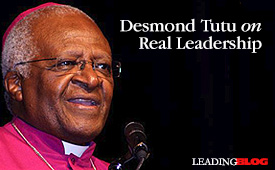
Posted by Michael McKinney at 12:07 AM
07.27.06

Extreme LeadershipIn his must-read book Real Leadership, Harvard professor Dean Williams remarks, “The exercise of leadership is not a trivial matter…. Passion is an important element in the realm of real leadership. If you are not passionate about making things better in your local school, enterprise, or community, then you should probably not seek to be the primary actor in the process of leadership and consider moving to the side.”Leadership is a big and challenging responsibility. It is a commitment to be responsible for the well-being of those you are leading. Much of what passes to day as leadership is role playing. Too often this is because those who get the titles are good at playing the role. But they're not leading. Steve Farber speaks to this well on his web site: Here's the problem: many people who call themselves leaders are only posing. They're wearing the label or accepting the title without putting their skin in the game. So I'm asking you—assuming that you really do aspire to lead—to approach the act of leadership as you'd approach an extreme sport: learn to love the fear and exhilaration that naturally comes with the territory. And that takes a personal commitment and a significant, personal choice. As my friend and colleague, Terry Pearce, said in an article in the San Francisco Examiner: "There are many people who think they want to be matadors, only to find themselves in the ring with two thousand pounds of bull bearing down on them, and then discover that what they really wanted was to wear tight pants and hear the crowd roar."If, however, you do make the choice to leap into the ring, it's because of your love of the challenge, the adventure, and that love is what makes the fear of the "sport" worthwhile. Not only do you accept the fear as part of the experience, the fear—in large part—creates and defines the experience. Extreme would not be extreme without fear. And fear would not be worth it without the love of the game.  The same is true of Extreme Leadership: it is the dynamic interplay of fear and love-two of the most powerful forces in the human experience. And in my estimation, those who actively and intentionally use the experience of fear and love everyday in their attempts to change things for the better—in whatever arena—are Extreme Leaders. Farber is the author of The Radical Leap and more recently The Radical Edge. His web site has a wealth of information on leadership that’s worth taking a look at.
Posted by Michael McKinney at 08:32 AM
07.24.06

Growing Concerns: Preparing Children for the Future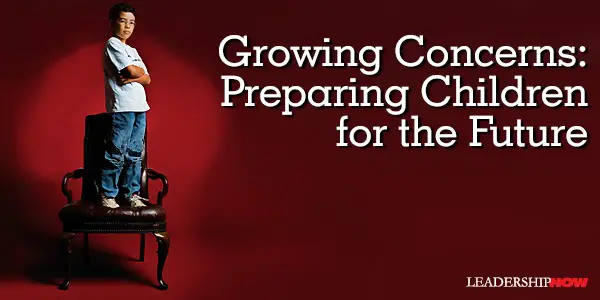
AT the 2005 National Education Summit on High Schools, Bill Gates remarked, “America’s high schools are obsolete. By obsolete, I don’t just mean that our high schools are broken, flawed, and under-funded – though a case could be made for every one of those points. By obsolete, I mean that our high schools – even when they’re working exactly as designed – cannot teach our kids what they need to know today. [W]e have to understand that today’s high schools are not the cause of the problem; they are the result.” In our conversations with a local school district, we suggested that the problems in the district are by and large brought on by the system itself. Unfortunately, they can’t get over the notion that the district's problems are the lack of money. True, due to the lack of money the Band-Aids are failing, but they are only a symptom. Unless the school board can drop this mindset, they will continue to face the same problems but with increasing intensity as time goes on. Obsolete paradigms keep otherwise bright people dumb because they can’t learn what needs to be done and develop a new approach. They have the answers but unfortunately, they can't see them.”  Michael Wald: I actually think childhood is getting longer. As more and more children go on to higher education, they are more dependent upon their families for longer periods of time. They live with their families well into their 20s. And most outcomes that we measure to gauge children’s well-being have improved in recent years.” William Damon: They’re creating their own families as much as a decade later than historical norms. And work commitments are being postponed beyond what any economy has ever tolerated in history. It creates a kind of moratorium where people can discover themselves and play out a lot of different possibilities, but the downside is that it creates uncertainty about what you’re going to end up doing in life. If you go back even a generation or two in our own society, when more kids were living on farms or helping their parents run delicatessens or whatever, they were taking responsibility early. I mean there were 14-year-old kids driving tractors all over this country and helping bring home the bacon. We’re not giving kids those kinds of responsibilities, even in disadvantaged families. Sometimes kids go out and get jobs at McDonald’s, but that’s different. They’re not running a little family business or preparing for a vocation, becoming a fisherman like Dad. A lot of kids are drifting, and are not so happy about it.” William Damon: What worries me is not the mass media; it’s the vanishing number of positive opportunities for constructive engagement that traditionally kids have had in our society. Everything from local playgrounds where parents used to let their kids go out and play stick ball to apprenticeships where kids would tag along with the neighborhood cop or show up at the newspaper and learn about reporting. If you get a kid involved in something positive, whether it’s sports or academics, or art, that kid is not going to get in trouble.” Fernando Mendoza: In my clinical experience, when you have parents engaged with kids, the kids can deal with a lot of negative influences. When parents, for whatever reason, don’t have the time or take the time to engage their kids, the chances are greater that media and other influences can sway kids.”
Posted by Michael McKinney at 10:13 AM
07.21.06

Best Airline Recipes Four humorous fake not-books – including Chicken or Beef? The World’s Best Loved Airline Recipes and Whoops. I Was Wrong by GW Bush – are the focal point of Abebooks.com’s birthday celebrations. 
Abebooks.com—probably the best place to look for used, rare and out-of-print books—is 10 years old and running a high profile multi-faceted marketing campaign across three continents. The non-existent books—which have the tagline If you can’t find it here, it doesn’t exist—are being showcased in newspaper and magazine advertisements in the United States, Canada, UK, Australia and New Zealand. Making Marriage Work by Henry VIII and Everything You Wanted To Know About North Korea But Were Afraid To Ask by Kim Jong Il complete the line-up of not-books, which were designed by advertising consultancy Rethink and printed by Trafford Publishing, a leading on-demand publisher. These titles are now out-of-print.
Posted by Michael McKinney at 09:55 AM
07.20.06

Avoiding Brain Drain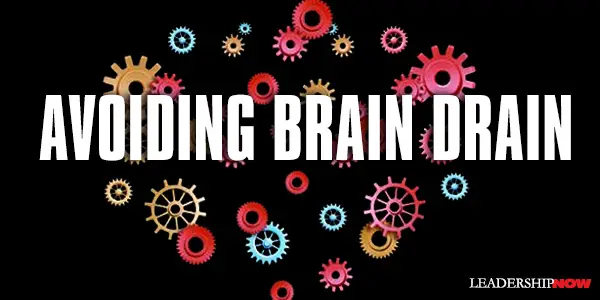 IN an excellent book written generally for leaders in Christian organizations—but with applications anywhere—Reggie McNeal stresses the importance of self-management and particularly the need to manage your mental health. In Practicing Greatness, he lists three “brain killers” that can sap an otherwise effective leader of their mental energy:
IN an excellent book written generally for leaders in Christian organizations—but with applications anywhere—Reggie McNeal stresses the importance of self-management and particularly the need to manage your mental health. In Practicing Greatness, he lists three “brain killers” that can sap an otherwise effective leader of their mental energy:• Negative People. Leaders need to be aware that when they allow themselves to be consumed by negative people (who seem inclined to seek them out), they allow precious mental, emotional, and spiritual energy to be drained from other leadership pursuits. He suggests “creating a mental boundary” and adopting “a strategy of surrounding yourself with positive people.” • Disorganization. Disorganization is a major brain drain. Not only does it consume time (“it’s right here—somewhere”) but it also raises anxiety (“what am I forgetting?”), which is another major cause of brain drain. The idea here is not to get your desk completely clean or that you match the organizational skills of someone who has a great propensity for this. You just want to defend against having a level of disorganization that creates a brain drain. • Tendency to second-guess decisions. Depending on personality and cognitive style, leaders need differing amounts of information and lead times in order to make decisions. But once decisions are made, the best leaders practice little second-guessing. “Would I have made the same decision with the same information I had at the time?” is a good question for leaders to ask themselves when tempted to second-guess. If the answer is yes, then the leader can move on. If the answer is no, then the issue is to find a better way to make decisions. 
Posted by Michael McKinney at 09:25 AM
07.17.06

Stepping Up to the Plate Anthony Castrovince at MLB.com reports: "What's happened is we've gotten to the point [as an organization] where the younger players are the ones who have to step up [and assume leadership responsibilities]," Wedge said. "I don't think anybody's really taken hold of that. Last year we had guys like [Kevin] Millwood and [Scott] Elarton, veteran guys who were more vocal." Wedge reflects, "It's tough for young people to get in front of their peers and put themselves out there like that.” Disturbingly he adds, “In the game in general, there's not too many leadership personalities out there. That's the generation we're in." His observations are a reflection of a more general concern we find in society at large. Why don’t more people feel the need to step up to the plate?
Posted by Michael McKinney at 04:48 AM
07.13.06

Jack Welch On Leadership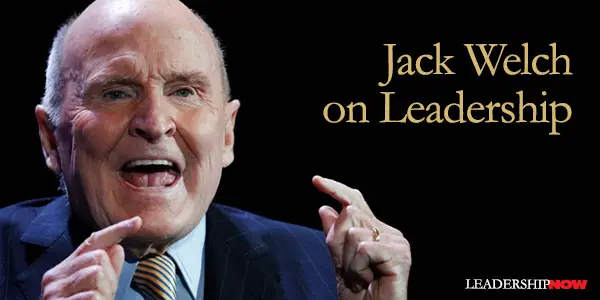
JACK WELCH revealed some lessons on leadership in a keynote address to the executives at the FranklinCovey Symposium in Dallas. Here is a recap as presented by Training Magazine: "Great leadership development is the heart and soul of every company. Now more than ever, companies shouldn’t be afraid to take risks by promoting tomorrow’s leaders into these roles today. It’s wonderful to have an organization that is dynamic and changing and getting fresh blood into management positions. Fresh eyes sometimes see fresh opportunities. Will they be ready? Maybe they won’t all be trained perfectly, but they will be able to grow into their job if you give them the right support systems. When I left GE, my successor was 46 years old, and his direct reports averaged 38 years old. That’s great stuff. 
Posted by Michael McKinney at 10:42 PM
07.10.06

Jack Welch: "What Worked for Me"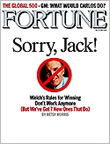
Posted by Michael McKinney at 09:32 PM
07.06.06

We Are Educating People Out of Their Creative Capacities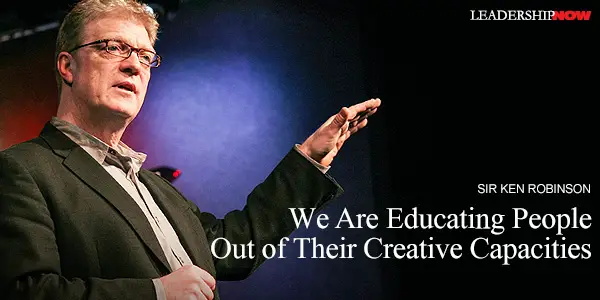
HERE is a presentation worth watching from the TED 2006 Conference. Sir Ken Robinson is author of Out of Our Minds: Learning to be Creative, and a leading expert on innovation and human resources. In this talk, he makes an entertaining (and profoundly moving) case for creating an education system that nurtures creativity, rather than undermining it. We don’t know what the future is going to look like, but we do know that it is moving away from the right brain dominated tasks brought on by the industrial revolution. (See Dank Pink’s, A Whole New Mind.) Robinson observes that our educational system is predicated on the idea of academic ability to meet the needs of industrialism. Yet it is this educational system is meant to take us into this unknown future. To meet this future we need to begin to educate the whole being. Here are some thoughts from his presentation: Creativity is as important as literacy and we should treat it with the same status. We don't grow into creativity, we grow out of it; or rather we get educated out of it.” His comments on making mistakes are important because I believe that we really only pay lip service to this in our personal lives, our families and organizations. Robinson states, “If you’re not prepared to be wrong you’ll never come up with anything original. By the time we become adults we are afraid to be wrong. We run our company this way. We stigmatize mistakes and as a result, we are educating people out of their creative capacities.” How true. But I think it comes second nature to us to respond to mistakes in this way. It is something that we really need to be conscious of. Beyond personal growth, the issues he raises in his presentation have far-reaching implications for developing and more importantly sustaining a learning organization. Einstein wrote, “Anyone who has never made a mistake has never tried anything new.” We lose the true value of our people by stigmatizing mistakes. Not all mistakes are acceptable of course, but a genuine mistake that people are taking responsibility for and learning from should be rewarded and encouraged. John Wooden said, “If you're not making mistakes, then you're not doing anything. I'm positive that a doer makes mistakes.” By treating mistakes and failures as a positive learning experience, people get better and make fewer and fewer mistakes.
Posted by Michael McKinney at 09:43 AM
07.03.06

George Custer and the Importance of Information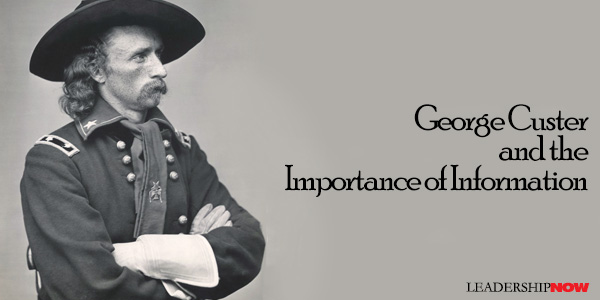
ONE-HUNDRED Thirty years ago on June 25, 1876 on the banks of the Little Big Horn River, the Battle of the Little Big Horn also known as Custer's Last Stand took place. It was reported that on the banks of the Little Big Horn River was the largest concentration of Indians from six tribes that history has ever recorded. It has been estimated that there were anywhere between ten to fifteen thousand Indians with over 2,500 warriors. Custer was in no position to pick a fight. Sadly, he decided to ignore that information. Leaders live and die on good information. Getting it is only half the battle. The other half is listening to it. Far too many leaders find themselves talking when they should be listening. Paying attention to information is especially important when it suggests that things are not what they seem to be. Custer's pride, unfortunately, cost him and those around him their lives.
Posted by Michael McKinney at 03:47 PM
|
BUILD YOUR KNOWLEDGE


How to Do Your Start-Up Right STRAIGHT TALK FOR START-UPS 
Grow Your Leadership Skills NEW AND UPCOMING LEADERSHIP BOOKS 
Leadership Minute BITE-SIZE CONCEPTS YOU CAN CHEW ON 
Classic Leadership Books BOOKS TO READ BEFORE YOU LEAD |
|